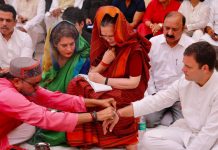
CONTRACTORS TO NGOS
Given the fact that the civil society and SC regularly emphasised the ban on private contractors and manufacturers, the politico-bureaucratic-commercial nexus found loopholes to wriggle out. One of the ways was for the “banned” private manufacturers to re-register themselves as NGOs (non-government organisations). In several hearings in the apex court, there were allegations that several contractors had done this to “over-reach the order” of the Supreme Court.
Several non-profit organisations (NPOs) and NGOs, which could supply food under ICDS, urged the SC to relax a few restrictions imposed by the governments. For example, they said that the three-year experience to bag icds contracts was too harsh. They maintained that the tenders should include a clause that allows NGOs and NPOs to treat the experience of the individuals connected with them as the organisations’ experience. Other NGOs emphasised that they had over three years’ experience, although they were registered as a society or trust for less than three years.
Critics argued that such relaxations would lead to backdoor entry of private contractors, who possibly got registered as NGOs. The SC said that the easing of the rules would allow them “to gain entry into such schemes without the social objectives of women empowerment as the actual perspective of their work.” At the end of the day, the real intention of the scheme was to empower the local communities, especially the SHGs. The desire was to discourage the private contractors, and involve the shgs through the ngos and npos. Finally, the NGOs and NPOs should go out of the picture too.
ENTRY BARRIERS FOR SMALL ENTITIES
A few states deliberately created barriers for local groups to win the tenders. They introduced clauses that stated that the bidders should have an annual turnover of at least Rs 1 crore for the past three years and fully-fledged automatic kitchen. Obviously, no SHGs, MMS or local community groups would fulfil either of the two conditions. According to a review petition (July 23, 2013) filed by People’s Union for Civil Liberties, which was the original petitioner on icds, “this was introduced in collusion with contractors to oust the Mahila Mandals, which are inherently small collectives of local women from the village. It was aimed to bypass the sc ban on private contractors and manufacturers. No Mahila Mandal in the country could meet the norm of automated kitchen and a turnover of more than a crore.”
However, in the 2011 Shagun Mahila judgment, the sc had disagreed. “We are not impressed by the submission… that the condition of having Rs 1 crore over the three previous consecutive years is either arbitrary or whimsical,” it said. The order added: “We are also of the considered opinion that the food, which is to be supplied to the recipients as a part of supplementary nutrition programme has to be prepared in the manner prescribed by the Government for safety and nutrient composition… ”
One of the states’ “expression of interest (EOI)” document stated: “The eligible Mahila Mandal, Mahila Sanstha, self helping saving group, should attach a certificate about producing of the Food or equivalent like Fortified Blended premix and supplying the same to the Anganwadis in ICDS for the last 3 consecutive financial years… ” Critics immediately jumped on the categories that were allowed to bid. They objected to the inclusion of ‘Mahila Sanstha’ in the eoi.
As a close observer explained, “The 2004 SC order had specifically mentioned the categories that could get ICDS contracts. Mahila Sanstha was not part of them. By including this category, the state allowed contractors to get in. The reason: Mahila Sanstha can be any organisation that has women members; they don’t necessarily imply local village groups. Now, any of the big companies could float such an organisation, and participate in the tender process.”
In many cases, it was found that the winning bidders were companies that owned factories, which produced food products. In November 2012, a report by Biraj Patnaik, who was the principal advisor for Saxena and Mander, said, “in some of the states the bureaucracy-contractor nexus is well-documented by agencies such as the State Lokayuktas. I am placing on record the papers… that we have obtained from Karnataka reflecting the detailed investigations of the Lokayukta in exposing the complicity of department officials in the corruption involving Christy Fried Grams Pvt Ltd… ”
The central ministry’s September 2009 circular stated that the states had to furnish a certificate that the scheme operated as per the strict safety and health guidelines laid down by the ministry and SC. It added, “This certificate will be required to be furnished along with the utilisation certificate and shall be signed by an officer not below the rank of Secretary to the State Government.” However, Uke, Maharashtra’s principal secretary, argued in his letter (December 2014), “While the local SHGs are producing good quality THR (take-home rations), they will never be able to match the quality of large-scale manufacturers. As such the circular… is likely to defeat the decentralisation process.”
Clearly, the well-intentioned and much-needed icds finds itself in a political whirlpool. Despite public utterances to involve local communities, the policy drafters have either deliberately or otherwise introduced clauses that may achieve the opposite objective. Modi has to tackle these crucial issues before he can convince the citizens that he offers good and transparent governance.












